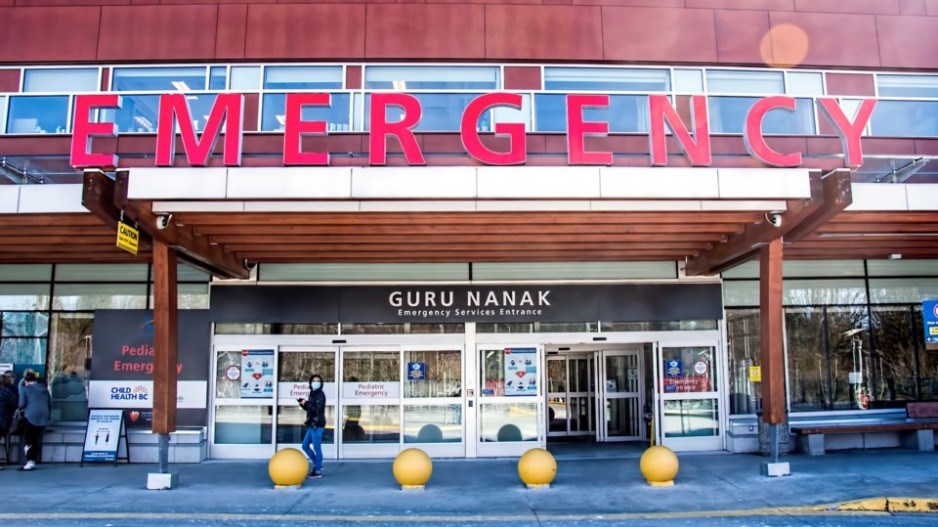The number of COVID-19 patients in B.C. hospitals has fallen to 388, the fewest since Jan. 7, according to new government data.
With that metric and others trending in the right direction, health officials revealed a timetable for lifting COVID-19 restrictions.
The trend in fewer hospital patients is clear as today's is the 22nd consecutive government data update with a lower count.
The last time the count was lower was also at a time when B.C. had a more restrictive way of counting COVID-19 patients, and did not count people who caught COVID-19 in hospital while there for another ailment. The previous restrictive counting system also did not count people after they had gone 10 days after first exhibiting symptoms, and were therefore deemed not infectious, as well as COVID-19 patients who normally live outside B.C.
Of those now hospitalized with the disease, 52 are sick enough to need care in intensive care units (ICUs) – the fewest since Aug. 17.
B.C. Health Minister Adrian Dix said that there are now about 9,400 people in B.C.'s hospitals. The province has 9,229 regular hospital beds and 2,353 other beds, dubbed "surge" beds, that were added during the pandemic and require extra resources to fill.
Four new COVID-19 deaths were reported in the past day, and authorities said one previous death was inaccurately deemed a COVID-19 death. The result is that B.C.'s pandemic death toll has increased by three, to 2,932.
The number of new cases has also been trending lower, giving health officials, and the government, the confidence to lift most remaining COVID-19 safety measures.
Starting March 11 at 12:01 a.m., British Columbians will no longer be required to wear face masks in indoor public settings, although individuals are free to continue to wear masks in those places. This applies to the public and employees.
Some other changes that take effect tomorrow include:
• Faith-based gatherings and events will no longer need to restrict attendance to those who are vaccinated;
• Overnight camps for children no longer need to submit COVID-19 safety plans to health officials; and
• Masks will no longer be required on public transit and BC Ferries;
Changes are also coming to seniors' care homes, with some of those homes as soon as tomorrow allowing more than one designated visitor per resident. The current situation is that those facilities are allowing residents to have a maximum of one designated, or social visitor. Residents are also now able to have one essential visitor, who would be a person needed to provide care, such as feeding or bathing.
"Some [care home] facilities will be ready tomorrow," Provincial Health Officer Dr. Bonnie Henry said. "Others, it may take a little bit longer to ramp up their ability to cope with larger numbers of visitors."
She said that all care homes should be able to accommodate additional visitors for residents by March 18.
One new outbreak at a health-care facility is at the Yucalta Lodge in Campbell River. Outbreaks at Overlander Residential Care in Kamloops and Gillis House in Merritt are deemed over. The result is that there remain 14 active infections in those facilities.
BC Vaccine Cards will continue to be required for entrance to restaurants, sporting events, clubs and other venues until April 8, at 12:01 a.m. After that, they will no longer be required, Henry said.
Also on that date, businesses will be able to transition from using their COVID-19 safety plans to having what Henry calls communicable disease plans. Post-secondary institutions' residences will also be allowed to house unvaccinated people starting on April 8.
B.C.'s high level of vaccinations is one reason Henry is confident that tighter restrictions can be lifted, she said.
Business advocates welcome the news.
“We are pleased that the state of the pandemic allows us to stop requiring masks and the use of the BC Vaccine Card, and lets businesses return to more normal operations with the removal of COVID Safety Plans along with things like capacity limits, one-way directions and plexiglass barriers,” said Paul Holden, president & CEO of the Burnaby Board of Trade.
At the Greater Vancouver Board of Trade, CEO Bridgitte Anderson said she also welcomes the changes.
"Some businesses may decide to continue to utilize mask policies, and the vaccine card, longer than required by public health," she said. "It is critical that everyone exercises patience and compassion as we collectively navigate these changes." •




